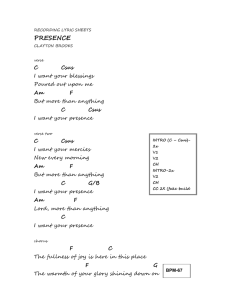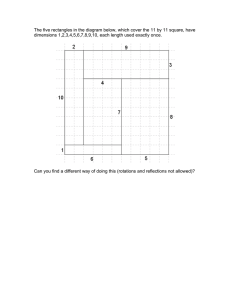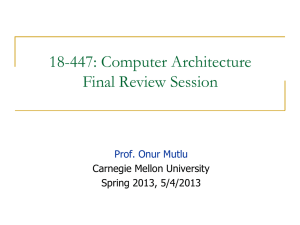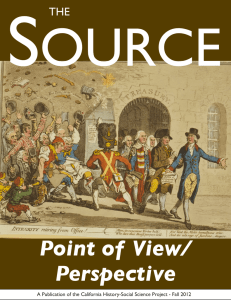Letter to teacher
advertisement
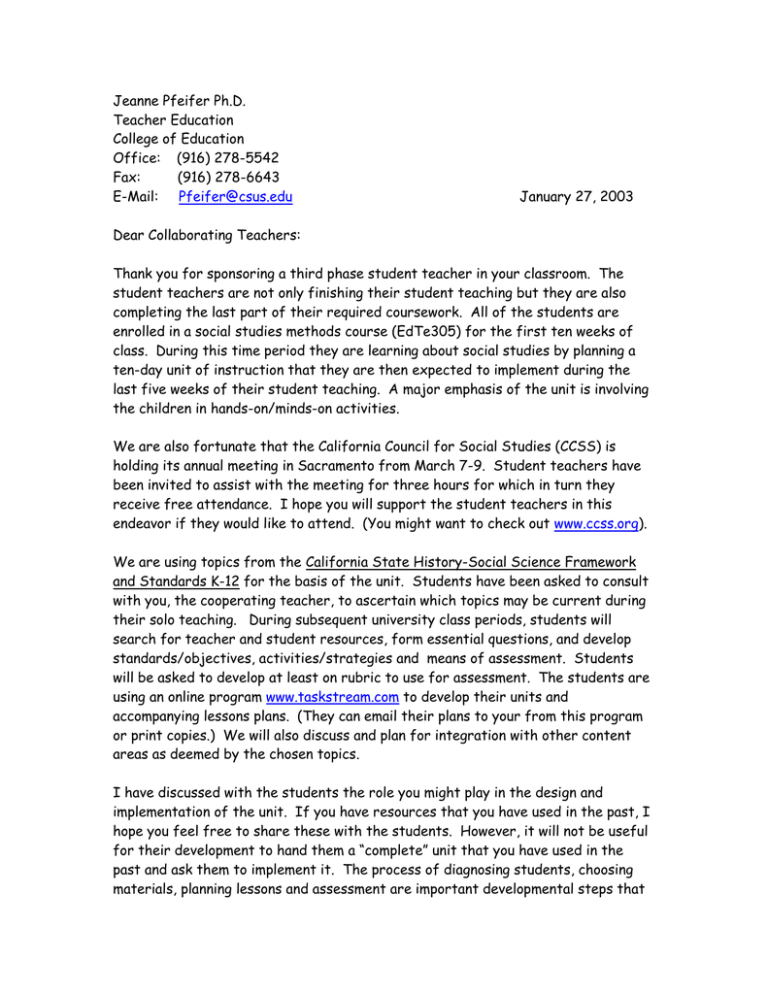
Jeanne Pfeifer Ph.D. Teacher Education College of Education Office: (916) 278-5542 Fax: (916) 278-6643 E-Mail: Pfeifer@csus.edu January 27, 2003 Dear Collaborating Teachers: Thank you for sponsoring a third phase student teacher in your classroom. The student teachers are not only finishing their student teaching but they are also completing the last part of their required coursework. All of the students are enrolled in a social studies methods course (EdTe305) for the first ten weeks of class. During this time period they are learning about social studies by planning a ten-day unit of instruction that they are then expected to implement during the last five weeks of their student teaching. A major emphasis of the unit is involving the children in hands-on/minds-on activities. We are also fortunate that the California Council for Social Studies (CCSS) is holding its annual meeting in Sacramento from March 7-9. Student teachers have been invited to assist with the meeting for three hours for which in turn they receive free attendance. I hope you will support the student teachers in this endeavor if they would like to attend. (You might want to check out www.ccss.org). We are using topics from the California State History-Social Science Framework and Standards K-12 for the basis of the unit. Students have been asked to consult with you, the cooperating teacher, to ascertain which topics may be current during their solo teaching. During subsequent university class periods, students will search for teacher and student resources, form essential questions, and develop standards/objectives, activities/strategies and means of assessment. Students will be asked to develop at least on rubric to use for assessment. The students are using an online program www.taskstream.com to develop their units and accompanying lessons plans. (They can email their plans to your from this program or print copies.) We will also discuss and plan for integration with other content areas as deemed by the chosen topics. I have discussed with the students the role you might play in the design and implementation of the unit. If you have resources that you have used in the past, I hope you feel free to share these with the students. However, it will not be useful for their development to hand them a “complete” unit that you have used in the past and ask them to implement it. The process of diagnosing students, choosing materials, planning lessons and assessment are important developmental steps that the student teachers need to go through themselves. Student teachers will be asked to turn in their plans at the end of the first 10 weeks for comments and suggestions. Most student teachers plan much more than what the children can accomplish and frequently student teachers must decide if they can lengthen the unit or if they need to eliminate some of the planned lessons. They will probably experience this and want to discuss it with you. Your insights and expertise will be invaluable to them in making these decisions. As they teach their lessons, I am asking them to reflect on each lesson in terms of the children’s learning. They may make adjustments to subsequent lessons based on these reflections and analyses. I am also asking them to videotape and edit a hands-on/minds-on less as well as photograph and /or scan samples of student work. They will turn their completed unit in again at the end of the semester with their reflections and suggestions for changes in their initial plans. One question that student teachers have asked about in the past is the “ten day requirement” for the unit. I have told them that more than one lesson may be taught in a day (e.g. reading and then another in social studies) and that one lesson may need to span more than one time period. I am looking for ten times (incidents) rather than ten actual days. If you have any questions please feel free to visit the website for the class www.csus.edu/indiv/p/pfeiferj and scroll down to the EdTe305 course. I can also be reached by phone and email. Thank you again for your help and support. Sincerely, Jeanne E. Pfeifer, Professor Social Studies Methods Instructor
